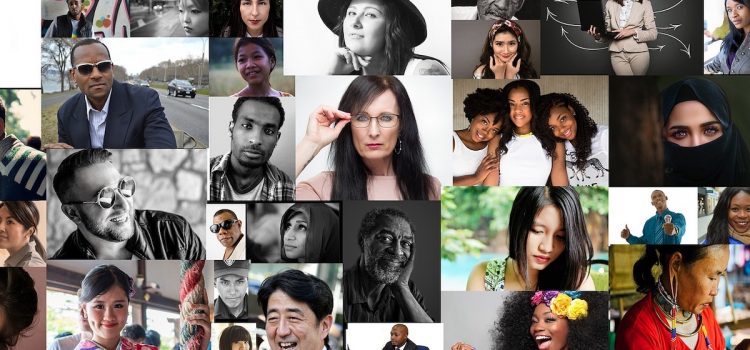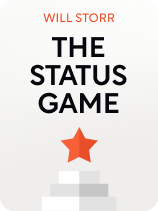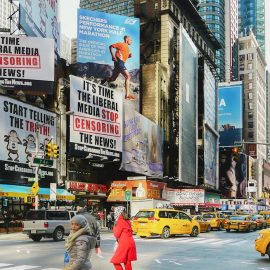

This article is an excerpt from the Shortform book guide to "The Status Game" by Will Storr. Shortform has the world's best summaries and analyses of books you should be reading.
Like this article? Sign up for a free trial here.
Why do people care about their status? Is social status important?
The Status Game by Will Storr explains that on a basic level, people play status games because we’ve evolved to do so. But the reasons that people care about status are more numerous and nuanced than that.
Below we’ll explore some of the reasons that explain the importance of social status.
We Evolved to Compete for Status
To explain the importance of social status, we need to go back to the beginning. Storr explains that early in human evolution, prehumans played dominance games that relied on aggression and violence. Then, as early humans evolved to live together and rely on collaboration to survive, social intelligence became more important than aggression. Members of a group could gain status through a success game by sharing knowledge or skills that could help the group. They could also gain status through a virtue game by demonstrating virtues like courage or generosity, or by exhibiting a commitment to the good of the group.
(Shortform note: Many experts believe that the survival advantage of living in groups had a crucial influence on human evolution. A key theory is the “social brain hypothesis” proposed by evolutionary psychologist Robin Dunbar. Dunbar theorizes that primates evolved large brains to meet the cognitive demands of living in complex social environments. The idea is that it required a lot of brain power for early humans to learn to live with others in a social group, to form alliances, to infer others’ states of mind, and to make sense of social information—as well as to use social intelligence rather than aggression to gain status.)
We Derive Psychological Benefits From Playing Status Games
Storr writes that another reason we play status games is that they meet our fundamental psychological needs—when we succeed in gaining status, that is. Gaining status can help us feel a healthy sense of belonging, and competing for status can also help us make social connections, thus fulfilling a basic psychological need.
(Shortform note: Experts regard social connections as crucial for our well-being. In Lost Connections, Johann Hari argues that a lack of social connections can harm us in a number of ways. For example, feeling disconnected from meaningful relationships with other people contributes to depression. Additionally, feeling lonely or isolated changes your body, such as by increasing levels of the stress hormone cortisol. Hari writes that this link between loneliness and depression might have been useful earlier in our evolution: It might have motivated our ancestors to stick together in social groups, improving their ability to survive.)
Games can also change us as we play them, as when we join a social network and engage with it compulsively to see what rewards get paid out when we post something. When we gain status, we want more. Storr writes that this might be because status isn’t a stable achievement that, once won, is ours permanently: It’s conferred on us by other people who can always take it away. We continually seek more status and believe that having more status will make us happy.
| How Social Media Affects Your Behavior (and Your Brain) Spending time on social media—a popular kind of status game—not only changes our behavior but also seems to exert a powerful effect on our brains. Experts say that as we come to believe that our worth depends on the number of followers we have and the likes we get, spending more time on social networks makes us feel inferior and hurts our self-esteem. Some experts think that we’re vulnerable to these effects because of our fundamental desires to belong and to gain social status. Because of these basic psychological needs, our brains treat information about ourselves—like the feedback we receive about our reputations and status each time we check into a social media app—like a reward. When the brain perceives a reward, pathways through the brain that process rewards become activated, and that activation leads us to seek more rewards. For instance, before you check Facebook or Instagram, you might not know whether someone else has left you a like, a comment, or a direct message. So you keep opening the app (or refreshing your feed) to see what reward you might receive. Researchers explain that this reward-based feedback loop can lead to social media’s negative psychological effects. These harmful effects can include feeling preoccupied with the social network, learning to use it to improve your mood, needing to spend more time on it to get the same psychological effect, or experiencing withdrawal-like symptoms when you stop using it. |
We Learn From Others to Play Status Games
A third reason that we play status games is simply that we learn them from others. Storr writes that beginning with our first status game as adolescents, we engage in a process of social learning to join a group and get the hang of its rules and symbols. Each time we join a group, we follow the same process to learn the game. Because the rules aren’t explicit, we learn to play by watching high-status people and mimicking them. We buy into the game, accepting the validity of its values, rules, and symbols.
(Shortform note: Storr’s theory about how we learn to play status games matches what other experts have observed of how we behave when we join a new social group. In The Laws of Human Nature, Robert Greene writes that when we join a group, we learn to match the ideas and values it promotes, in a process similar to what Storr describes. Greene writes that in addition to adopting the group’s ideas, we also work to fit in in more visible ways, such as by changing our physical appearance. According to Greene, we also learn to perform our belonging with the group—but the more time we spend with the group, the more real the performance becomes.)
Storr writes that just as we learn to play games by watching other people, we also learn to calculate our status by comparing ourselves with others. We feel jealous of other people’s success, particularly when we observe that there’s extensive inequality between the top of the hierarchy and the bottom. That occurs in part because we want not just to receive a reward, but to receive a reward that’s bigger or better than what others have. (Shortform note: Researchers have found that we care more about getting a reward when other people don’t. That means that we compare what we have to what others have to understand rewards like social status.)
(Shortform note: Psychologists have a name for the idea that we understand our social status by comparing ourselves to others: social comparison theory. We make social comparisons when we look to other people to determine how our behavior, our beliefs, or our status measure up. Psychologists think that social comparison is normal and can sometimes exert a positive effect by motivating us. But it can also have negative consequences. In fact, some experts think that a healthier way to build our self-esteem is to cultivate gratitude for what we’ve already achieved—though substituting gratitude for social comparison can be difficult in the moment.)
In the process of learning how to play a particular game, the game changes us. That can be a good thing, if we gain social connections and gain status by exercising skill or creating knowledge. But it can also hurt us and those around us if we fall prey to some of the more insidious effects of status games.

———End of Preview———
Like what you just read? Read the rest of the world's best book summary and analysis of Will Storr's "The Status Game" at Shortform.
Here's what you'll find in our full The Status Game summary:
- How life is just a game of status and you're a player in it
- How the status game works and what you can do to avoid the toxicity
- What happens when the status games go wrong






